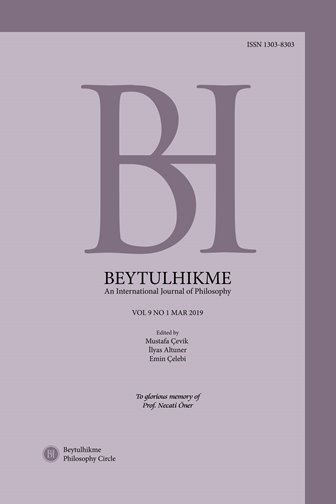Author :
Abstract
Bu çalışma 20. asır Alman felsefe tarihçisi Ernst von Aster hakkında kısa bir biyografik bilgi ve onun 1943-1944 eğitim öğretim döneminde İstanbul Üniversitesi, Edebiyat Fakültesi, Felsefe şubesinde vermiş olduğu “Çağdaş Felsefe” ders notlarından oluşmaktadır. Söz konusu dönemdeki felsefe öğrencilerinden Cahit Tanyol’un Osmanlı Türkçesi ile tuttuğu notlardan oluşan metin, Latin alfabesine çevrilerek, yayınlanmaya hazır hale getirilmiştir. Bu dersler, Descartes’in felsefesi özellikle varlık anlayışından başlamaktadır. Bundan sonra Descartes ile Newton’un evren ve mekanik hakkındaki fikirleri karşılaştırılmaktadır. Peşinden Newton fiziği ve Kant’ın felsefesi arasındaki ilişkiler incelenmektedir. Daha sonra Kant metafiziği ile Brentano’nun felsefesi karşılaştırılmaktadır. Yeni Kantçılık ve Schelling ilişkisinden sonra, Kant’ın Husserl ile karşılaştırılmasıyla devam eder notlar. Ayrıca Heidegger’in ontolojisinde önemli kavramlar zaman ve mekân kavramları anlatılırken, Descartes ile Heidegger’in varlık anlayışı karşılaştırılır. Son olarak Hans Driesch’in vitalizmi ve Bergson’un spritüalizmi anlatılmaktadır. Bergson’un ve Darwin’in evulusyon anlayışlarının karşılaştırılmasından sonra notlar, Yeni Pozitivizm konusu ile bitmektedir.
Keywords
Abstract
This study is composed of short biographic information about Ernst Von Aster, 20th Century German historian of philosophy, and the lecture notes about “Contemporary Philosophy” that is given by him at Istanbul University Faculty of Literature Philosophy Department in the 1943-1944 academic period. The text which is the lecture notes taken by Cahit Tanyol, a student at the Philosophy Department in the above-mentioned period, in Ottoman Turkish has been translated into Latin alphabet and made ready to be published. Lecture notes are started with the Descartes philosophy, especially his existence approach. Then the views of Descartes and Newton about universe and mechanics are compared. Right after the relations between Newton physics and Kant philosophy are examined. Subsequently, Kant metaphysics and the philosophy of Brentano are compared with each other. After the comparison between Neo-Kantianism and Schelling, the relation between Kant and Husserl is examined. On the other hand, time and space in the Heidegger’s ontology are dealt with. Also, the existing approach in Descartes and Heidegger is investigated. Lastly, Vitalism of Hans Driesch and Spiritualism of Bergson are dealt with. The lecture notes end with the New Positivism after comparison is made between evolution approaches of Bergson and Darwin.
Keywords
- Akarsu, B. (1949). Öğrenci Gözü İle Ernst von Aster, İstanbul Üniversitesi Edebiyat Fakültesi Felsefe Arkivi, 2 (3), 19-21.
- Gökberk, M. (1949). Ernst von Aster'in Felsefedeki Yeri, İstanbul Üniversitesi Edebiyat Fakültesi Felsefe Arkivi, 2 (3), 10-18.
- Gökberk, M. (1982). Felsefe Tarihi. İstanbul: Remzi Kitabevi.
- Kranz, W. (1949). Ernst von Aster’in Şahsiyeti. İstanbul Üniversitesi Edebiyat Fakül- tesi Felsefe Arkivi, 2 (3), 7-9.
- Onar, S. S. (1949). İstanbul Üniversitesi Rektörü Ord. Prof. Dr. Sıddık Sami Onar'ın Ernst von Aster’in Vefatına Dair Söylevi, İstanbul Üniversitesi Edebiyat Fakültesi Felsefe Arkivi, 2 (3), 1.
- Ülken, H. Z. (1949). Ernst von Aster ve Bilgi Teorisi, İstanbul Üniversitesi Edebiyat Fakültesi Felsefe Arkivi, 2 (3), 50-62.
- Von Aster, E. (1949). Modern Fizik ve Felsefe, İstanbul Üniversitesi Edebiyat Fakültesi Felsefe Arkivi, Cilt:2, Sayı:3, Sayfa: 98-106.
- Von Aster, E. (1994). Aster’in Yayınları, İstanbul Üniversitesi Edebiyat Fakültesi Felsefe Arkivi, Cilt:2. Sayı:3, Sayfa: 98-106.
- Von Aster, E. (1994). Bilgi Nazariyesi ve Mantık. (Çev. M. Gökberk). İstanbul: Sosyal Yayınlar.
- Von Aster, E. (2005). Ernst von Aster’in Ders Notları: İlkçağ ve Ortaçağ. (Sad. V. Okur). İstanbul: İm Yayıncılık.





